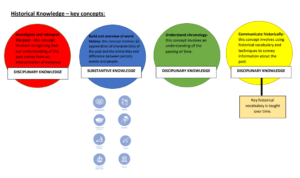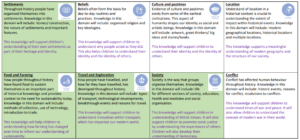HISTORY
Our vision for History at Knaphill Lower School:
Our vision for history at Knaphill Lower School is based on children developing excellent historical knowledge and understanding, through well-sequenced, well-taught lessons, which include opportunities for children to develop their own sense of curiousity about the past. We see history as a crucial opportunity to develop our children’s character, as children are encourage to learn from the mistakes, struggles and achievements of those who have gone before us.
By promoting curiosity and historical investigation skills, as well as our school values, we aim to impact our children’s personal development. We believe that all children have the right to access a rich history curriculum that encourages children to develop a breadth of understanding, whilst applying this knowledge to a real-life context of life today to help them understand the world they are growing up in. We have designed an engaging and inspiring curriculum that embraces themes of innovation, social justice and sustainability, so that children understand their part in creating a bright future. Historical knowledge of key national events and key people is selected to allow children to understand Britain today as a diverse, democratic, and increasingly sustainable and innovative society. Over time, children will build a rich historical vocabulary, which will allow them to communicate their thinking, verbally and in their writing. To create a strong schema, our history curriculum makes meaningful links to other areas of the curriculum, including science, by including scientists that have made notable change, and art, during which we covered a breadth of artists from across history. Our powerful history knowledge of people is designed to consider representation (gender, heritage and race) to promote social justice and inspire all children to have aspiration for their own future.
Our curriculum offer will exceed the National Curriculum and is enhanced by trips and visits, such as the first-hand experience of seeing the impact of the Great Fire of London from the London Eye and Thames River; links with local history (including Brooklands Race track and airspace), and an application to real-life contexts, which encourage children to consider how they can create their own change for the future.
Our history curriculum helps our children to create a bright future by allowing them to stand upon the shoulders of giants.
The intent of history lesson at Knaphill Lower School is that children develop:
- An excellent knowledge and understanding of selected people, events, concepts and innovations.
- A passion for history and an enthusiastic engagement in learning, which develops their sense of curiosity about the past and their understanding of how and why people interpret the past in different ways.
- The skills to consider they we can use the learning about the past to influence their lives now.
- The confidence to challenge prejudice and embrace identity.
- The ability to communicate historical knowledge with confidence.
- The ability to use evidence derived from a range of sources to draw conclusions about history.
- The ability to think, evaluate, reflect, discuss and ask questions about the past.
- A desire to embrace challenging activities, including opportunities to undertake high-quality research across a range of history topics.
Knaphill Lower School – Curriculum Drivers: Values
Throughout all curriculum subjects, children are given opportunities to apply to Knaphill Lower School values in their learning.
In History, key values have been identified as:
- Curiosity – this value sits at the centre of history as historians show historical curiousity as they persist with their investigations to find the answer to their questions.
- Kindness – beginning to develop kindness into compassion and empathy, by understanding how people were treated and the challenges they faced.
- Aspiration – through understanding the lives of inspirational people and applying their thinking and behaviour to their own lives.
- Equality – inspirational historical people have been selected to emphasise the need for equality and to look at example on inequality.
History Concepts and Domains
To ensure that the most useful knowledge is selected within the History curriculum, the History Leader has used research to determine key historical concepts and domains of knowledge.

At KLS, our history knowledge is organised into domains. All domains are included within our history curriculum, however, Settlements, Society, Food & Farming, travel and exploration have been identified as our prime domains as they support our curriculum drivers (social justice and values/ character education) and key concepts (community, sustainability and innovation).




